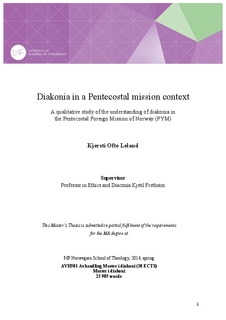Diakonia in a Pentecostal mission context. A qualitative study of the understanding of diakonia in the Pentecostal Foreign Mission of Norway (PYM)
Master thesis
Permanent lenke
http://hdl.handle.net/11250/219148Utgivelsesdato
2014-09-09Metadata
Vis full innførselSamlinger
Sammendrag
This thesis is a study of Christian social effort and development work (diakonia) in a
Pentecostal mission context. More specifically I have studied the mission organisation of the
Pentecostal Movement of Norway (Pinsebevegelsen i Norge) and my research question has
been: What is the understanding of diakonia in mission of the Pentecostal Foreign Mission of
Norway (PYM, De norske pinsemenigheters ytremisjon)? I have done a qualitative analysis of
PYM documents from 2010-2013, both basic documents and information documents. I have
analysed and discussed this material in light of different theories of diakonia in mission work
or Christian development work. This has included a look at different understandings of
salvation and the calling of the church, and the relationship between diakonia and
evangelisation in mission. My findings suggest that PYM has a holistic approach to mission
because it includes both diakonia and evangelisation in its calling and its mission work in
practice. At the same time, PYM is clearly influenced by a traditional understanding of
mission, which emphasises salvation as liberation from sin and Christ’s calling of the Great
Commission to proclaim the gospel. However, when PYM presents its Norad funded projects
it makes an effort to separate the development work from evangelisation. At the same time
PYM often emphasises its local church partnerships here. Different opinions of the role and
position of diakonia in PYM seem to create a tension in the organisation. I claim that these
different opinions on diakonia in PYM make PYM’s understanding of diakonia seem
inconsistent.
According to the PYM documents, PYM seems to adapt its diaconal work to different
contexts, like when cooperating with Norad. A specific Pentecostal aspect of PYM’s
understanding is the multidimensionality of salvation. Salvation from sin can also contribute
to a better life on earth. Therefore, in summary, I would call PYM’s understanding of
diakonia Pentecostal and adaptable.
